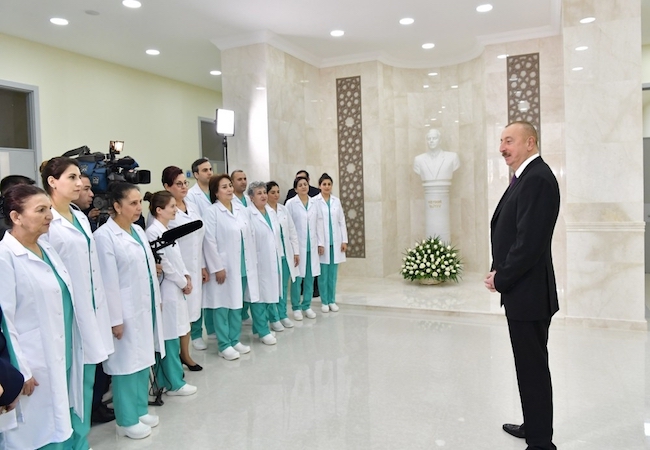
By Aslan Aslanov
For almost a hundred days now, the world has been waging war against an invisible enemy – coronavirus. Strict isolation measures are being taken around the world. Borders are closed. Planes have stopped flying, trains have stopped running. Classes in schools have been suspended. All public and sporting events have been canceled. The once crowded streets and squares, parks and alleys have plunged into silence. Half of the world’s 7 billion population – almost 4 billion people – are sheltered in place.
At the same time, the number of those infected and perished from COVID-19 is growing by the day. The figures changing on an hourly basis are a testimony to the greatest challenge humanity is facing. Losses differ – they vary across continents, countries and even cities. Comparison of the figures shows how effective the fight against the virus is in different countries. Azerbaijan can be cited among model countries, handling the COVID crisis accordingly.
The correct and timely decisions made by President Ilham Aliyev have allowed the country to reduce losses to a minimum. The government provides maximum social support to the most diverse segments of the population. It is no coincidence that Azerbaijan is one of the countries noted for the effectiveness of its anti-coronavirus measures.
A hundred days that shocked the world
In order to provide a realistic assessment of the actions Azerbaijan has taken during the pandemic and the advantages of the president’s strategic approach to the problem, it is necessary to review the developments that have unfolded in the world and in Azerbaijan over the past 100 days. In other words, a global problem requires examination through a global prism.
The first report about the disease caused by the new coronavirus was circulated on December 31. Even though the disease turned into an epidemic some time later, the world did not attach particular importance to what was happening. People in Americas and Europe thought the virus would not reach them. The world seemed to forget about globalization just for a moment, and it cost it dearly. There are more than 3.5 million infected in the world today and nearly 250,000 people have died. The time that has passed since the spread of the virus began can be described as a period that shocked the world in the literal sense of the word. For about 100 days now, there has been a merciless confrontation between a man and the virus, and no-one knows when this will come to an end.
The alarm was first raised by the World Health Organization in mid-January. Some countries immediately moved to action, others didn’t take it seriously. Interestingly, the most difficult situation with coronavirus is observed in the USA, a superpower, in Europe which boasts its advanced healthcare system. The developed West accounts for the vast majority of those infected and deaths worldwide. A paradox, but it is the reality. The conclusion reached by one of the most popular German publications is worthy of note: Europe is faced with the biggest test of the post-war period. And it suffers one failure after another. If things go on like that, the European Union may fall apart.
Every state has its own policy, a “national” approach to the pandemic, so to speak. Who made the mistake and where? Who was late in taking action or did not take the problem seriously? Time will definitely answer these questions, but we want to pay attention to the human side of the problem, to the dismal picture. From this point of view, it would be appropriate to recall an idea mentioned by First Vice- President of Azerbaijan Mehriban Aliyeva in her address to the people: There is no such thing as someone else’s misfortune. Pain and suffering have no boundaries.
In the words of Mrs. Mehriban Aliyeva, “even the most developed states with multibillion-dollar healthcare budgets, boasting immense scientific and intellectual potential and possessing all of the advanced technologies could not stop the spread of the epidemic”. Indeed, the disease is spreading so rapidly that it can bring down the health system of any country. We have been witnessing the fact that hospitals of some developed countries are overcrowded, patients are placed in halls and treatment options have been exhausted. There were countries that had to choose amongst patients. Hundreds of people in nursing homes were left to the fates.

Naturally, if the situation had got out of control in the same way, we would have faced a similar scenario. In addition, the virus had already reached the neighboring countries. An epidemic could break out in border regions with heavy traffic at any time.
The measures taken by the government of Azerbaijan at the right time, the decisions it made demonstrates that the situation was under the control of the president day and night. He carefully monitored the course of events, studied and accurately assessed the risks.
The strategy centered on human life restored faith in Azerbaijani doctors
Sometimes the fight against coronavirus is compared to a war. In any war, the commander has a combat strategy and precise tactics. But it is difficult in the current circumstances: on the one hand, the enemy is not visible, on the other, the situation changes rapidly.
Despite this complexity, President Ilham Aliyev’s strategic view of the problem and its forward-looking decisions based on a risk assessment contributed to the achievement of the main goal – preventing the spread of the virus and breaking the chain of infection. This is precisely what the President of Azerbaijan’s policy was aimed at from day one of the pandemic. He said: “The priority for us is people’s health, their life and social protection.” As a result of resolute preventive measures, the situation was taken under control. A positive trend appeared in the ratio of those getting infected and those recovering. Azerbaijan’s healthcare system demonstrated a capacity to overcome the difficult test.
Most coronavirus patients have received and are receiving high-quality treatment in more than 20 public hospitals built in recent years. At a time when the epidemic was raging, the opening of a modern Yeni klinika hospital with 575 beds and the commissioning of an enterprise producing 250,000 medical masks a day at the Sumgayit Chemical Industry Park proved to be a huge advantage. Currently, on the instructions of President Aliyev, construction of 10 modular hospitals is underway. The commissioning of these hospitals means an additional 2,000 beds. If we add to this the 1,000 beds delivered in March, the 18 laboratories operating today, and the high professionalism and dedication of our doctors, one gets the idea of the current state of Azerbaijan’s healthcare system and the proportions of the work done.
In military terms, healthcare workers are at the forefront – doctors, nurses, orderlies, laboratory assistants and others. A whole army of highly qualified health workers is fighting for human life.
The thoughts shared by First Vice-President Mehriban Aliyeva, a doctor by profession, on her Instagram page show the high appreciation of the selfless work of medical workers. “These days, we are rediscovering the fact that the medical profession is called a sacred mission. Indeed, it has always required profound knowledge and refined skill. But today our medical workers are also required to display great personal courage. And they are passing this difficult test with dignity.”
A success story in the making
Comparing the number of cases of infection and deaths, one can clearly see that Azerbaijan is managing the treatment of COVID-19 successfully: to date, of 1,932 people infected with coronavirus 1,441 people have recovered. There have been only 25 fatalities. For both indicators, we are in a much better position than our closest neighbors Iran, Russia and Turkey, as well as the most developed European countries such as Italy, Spain, France, Great Britain, Belgium. Azerbaijan is one of a handful of countries where cases of infection and deaths per capita are at the lowest level.
The foresight, the wise decisions of the Azerbaijani leadership, the correct assessment of risks and the solidarity of the people prevented the worst-case scenario and returned faith in the country’s doctors.
A superficial perception of the issue, delays and disagreements between governments and societies lead to bitter consequences. The current global picture is very sad: the United States has 1,188,000 infections and 68,602 deaths, Italy has 210,000 and 28,884; Great Britain has 186,000 and 28,446; Spain has 247,000 and 25,264; France 168,000 and 24,895, respectively … Or Belgium, located in the center of Europe, ranks first in the world for the number of coronavirus victims per 100,000 people.
There are success stories too, and South Korea, Japan, Singapore and China itself are mentioned in this regard most often. It would be perfectly legitimate to include Azerbaijan on this list.
Throughout history, peoples have been saved from difficult situations and crises by the political will and foresight of their leaders. During major challenges, the main task facing every leader is precisely the rescue mission.
Aslan Aslanov is the Chairman of the Board of Azertac and President of OANA.




